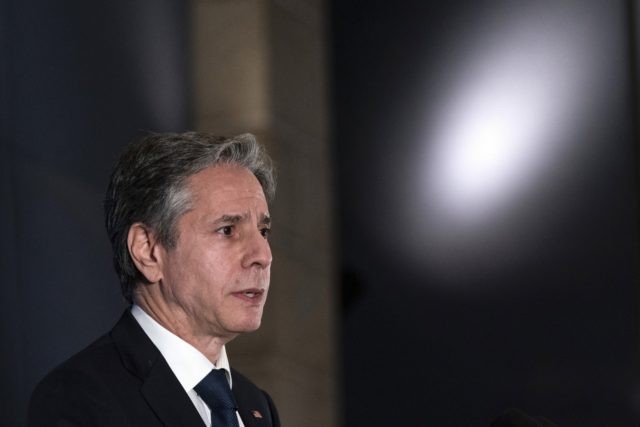Secretary of State Antony Blinken said Israel “took very significant steps” to avoid civilian casualties in Gaza during the recent 11-day war with the Hamas terror group.
Stopping the cycle of violence, Blinken told Israel’s Channel 12 news, was a key imperative and could only done by ensuring “Israelis and Palestinians alike have equal measures of security or opportunity of dignity.”
Blinken made his remarks during a visit to Jerusalem, as part of a regional tour which also included stops in the Ramallah, Amman and Cairo.
Asked if the Biden administration had any plans to reconsider the sale of precision-guided missiles to Israel in light of mounting pressure from progressive Democrats in Congress, Blinken answered:
President Biden has been absolutely clear, and he’s been clear on more than one occasion: We are committed to Israel’s security, period. We will make sure that Israel has the means to defend itself particularly when we had something like Israelis experienced in the last couple of weeks. Attacks from a terrorist group indiscriminately targeting civilians. We want to make sure that Israel has the means to deal with that.
Asked if Israel sought to avoid hitting civilians during the recent conflict, Blinken acknowledged: “I think Israel took very significant steps to do that, but we also know that on both sides men, women, and especially children were lost, and I think that’s deeply painful, and it’s a reminder that we throw around numbers, statistics, but these statistics, these numbers can’t hide the fact that we’re talking about real human beings,” he said.
More than 4,000 terror rockets were launched at Israel from the Hamas-ruling Gaza Strip over a period of 11 days. According to the Hamas-run Gaza health ministry, more than 230 Palestinians were killed in retaliatory strikes by the IDF against terror targets, 59 of them children.
Israel says more than 150 of those killed were terrorists from Hamas and the Palestinian Islamic Jihad terror groups. Many, including children, were also killed by errant Hamas rockets. At least 450 rockets were misfired and landed within Gaza itself.
Thirteen people in Israel, including a five-year-old boy and a 16-year-old girl, were killed by rockets, and hundreds more were injured.
Gaza director of United Nations Relief and Works Agency (UNRWA) Matthias Schmale also commended Israeli military strikes in the Gaza Strip for being “very precise” and “sophisticated,” remarks he later apologized for after being met with outrage by Palestinian rights groups and Hamas itself.
In the interview with Channel 12, Blinken expressed the Biden administration’s support for the two-state solution.
“We continue to believe very strongly that a two-state solution is not just the best way, but probably the only way to really assure that going forward, Israel has a future as a secure Jewish and democratic state, and the Palestinians have a state to which they’re entitled,” he said.
He said that right now, however, efforts were in “trying to build on the ceasefire, address the immediate needs and concerns.”
Addressing the Biden administration’s plans to reenter the tattered the 2015 Iran nuclear deal, Blinken said “the jury is still out.”
“I think we’ve clarified increasingly what each side would need to do to come back into compliance with the JCPOA, but it remains an unanswered question whether Iran is actually prepared to do what it needs to do to come back into compliance,” Blinken said of the Joint Comprehensive Plan of Action.
Blinken admitted Israel saw things differently about how to go about preventing Iran from obtaining the bomb.
“We are joined in that goal and in that commitment. It’s also no secret that over time we’ve had differences over the best way to get there, to make sure that Iran does not get a weapon,” Blinken said.
In an implicit critique of the Trump administration, Blinken said the deal was on the right track before Trump pulled out, with Iran needing at least a year to produce enough material for a bomb.
“It would have given us plenty of time to do something about it. But now that we’re out of the deal and Iran has started to ignore the constraints that the deal has imposed and it is closer and closer and closer to producing the material for a nuclear weapon on very short order,” he said.
“And so far from getting less dangerous without the deal, it’s gotten more dangerous,” he warned.
He reiterated the U.S. commitment to make the deal “longer and stronger.”

COMMENTS
Please let us know if you're having issues with commenting.